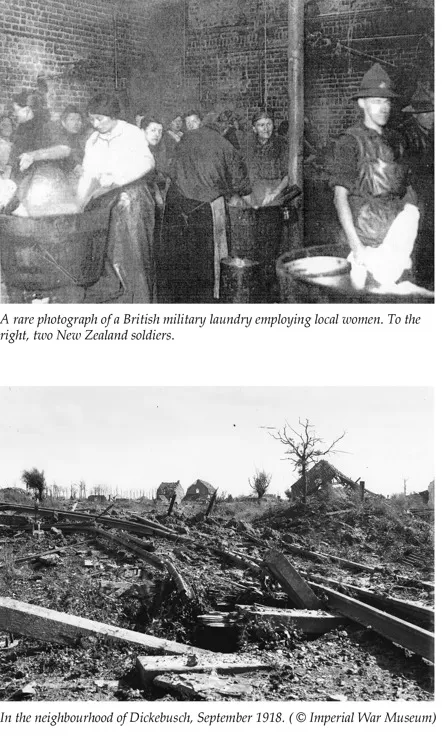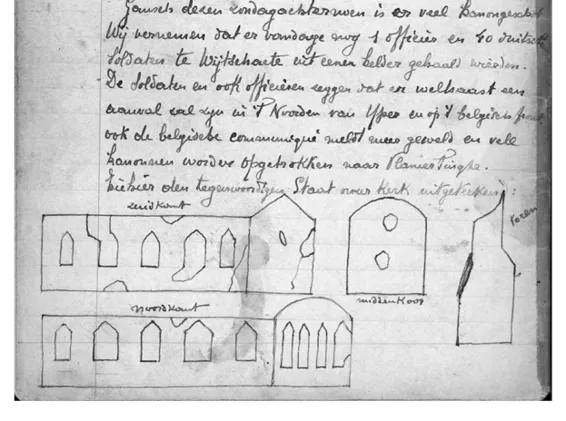![]()
10 June, Sunday. Quite a lot of firing in the night. In the early morning the Germans send shrapnel shells over to behind Razelput and during high mass to Marcel Coene’s farm, probably aiming for the balloons. A fair number of people in the masses, in the high mass, however, rather fewer than usual. Between masses I go to the centre of the village. The guns have gone from De Hert and from the Onraet and Comyn farms. The guns behind Baes’s farm and at Oudewal, the Planckeel farm, Commeerestraat and Vijf Geboden are still there and are firing hard above my head. The 60-pounder from Dalle’s farm left yesterday too. Our village is sadly changed since my last visit. The following houses have now joined the list of those that have been bombarded: the houses of Henri Dumortier, Henri Vermeulen, Henri D’hellens, Theophiel De Baene, Jules Noyelle, Justin Thevelin, Désiré Delanotte, Theophiel Leeuwerck, Maria Lauwyck, Jules Deraeve, Henri Van Damme, Désiré Van Renterghem, and the widower Francis Goethals. (The whole of Van Renterghem’s house and a third of Goethals’s were wiped out by a single shell.) The houses in best condition are those of Edward Lauwyck, Angillis, Leon Batteu, Maurits Devos, Benoit Leleu, and Mr Nollet (the schoolmaster), as well as the school, and then those of Bruno Van Wonterghem and Arthur Dumortier. However, of all these houses only one of them, that of Edward Lauwyck, could be restored at a cost of less than 1,000 francs.
Our church is in a dreadful state. More shells have fallen on the roof and one exploded in the wall next the altar of Saint Sebastian and has split the marble niche. Luckily our splendid central altar is still unharmed. On the altar I see a picture of Our Lady of Sorrows which I haven’t seen before. It was probably placed there by the soldiers from Voormezeele or Ypres. I don’t see any new shell holes in our churchyard. The English cemetery in Justin Thevelin’s meadow is full. I estimate that around 700 have been buried there. They are making a new cemetery on the triangular field used by Jules Philippe, along the other side of the gravel road, and 25 soldiers have already been buried there. On and round about the village the soldiers are billeted only in houses and shelters. However, I see a lot of horses along the dam of the lake, and I notice that in the meadow in front of Monsieur Peirsegaele’s brewery there are already a lot of tents where infantrymen are encamped. There is already a wide and very busy thoroughfare running through Thevelin’s meadow and the lakeside marshes to Ridge Wood. At Hector Dalle’s unloading quay I see more equipment than ever. At the dairy, where recently not a soul ventured, there is now a lot of hustle and bustle. There are a good many Red Cross motor cars and also 3 enormous shelters for the wounded.
The people of Dickebusch are pleased about the good outcome and now think that they will have no more shells. The few who fled in recent days are quick to return. Some who fled earlier are already asking permission to return. But sadly the calvary of our people is not yet at an end. What bitter disappointments still await us? But in any case, the taking of Wytschaete is a very good thing for our village. Before that, the nearest Germans were just 37 minutes’ walking distance from us, whereas now the distance is almost 7 kilometres. I reckon that the number of our civilian population has never fallen below 300.
All this afternoon there was a great deal of shelling. We hear that 1 officer and 40 soldiers were found in a celllar in Wytschaete today and taken prisoner. Both the soldiers and the officers say that there will probably be an attack to the north of Ypres and on the Belgian front. The Belgian communiqué, too, reports fiercer fighting and a lot of guns have been moved up to Vlamertinghe.
Here you can see a sketch of the current state of our church:
The Daily Mail says that in the battle of Wytschaete no less than 6,000 tonnes of explosive were used to blow up the mines (i.e. 6,000,000 kilos). The explosives consisted of one sixth ammonal and the rest dynamite and melinite. The digging, and the placing of the mines, had taken 20 months and was largely the work of Canadian engineers. There were 20 mines in Messines, Wytschaete and Hill 60. All of them went off successfully except one at Hill 60. Where the mines went off it was unbelievable how the ground was thrown out in all directions and ripped apart, and in a single moment hundreds of soldiers were buried under the eruption. They left appalling craters. An interpreter told me that at Spanbroekmolen one crater was so immeasurably huge that all 3 of the parish churches of Poperinghe could fit into it. I have heard others confirm this.
From questioning of the Germans it is understood that they did not know the time of the attack, although they expected it to come within the next two days.
In the battle of Wytschaete Major Redmond died. He was a member of the British parliament and brother of the Irish leader. He was 56. He was fatally wounded at Wytschaete and died a few hours later at Locre.
In such circumstances it is clearer than ever how impoverished the Protestant religion is, and how stark the work of its clergy. When a wounded Catholic is brought in, the Catholic chaplains give him the last rites if necessary; the Protestant chaplains do not know these sacraments and all they can do is offer their poor co-religionist a cigarette and promise that they will notify his wife or his parents of his death. Some of them try to ape the Catholics: so a Protestant chaplain was seen with a little bottle and a little brush, and all his wounded receive a little brushing. Father Brickford was in a dressing station not far from the Lille Gate during the fighting, and he told me that at night, before he took a few short hours’ rest, he asked a medical orderly: ‘If wounded Catholic soldiers are brought in, please come and wake me.’ The Protestant and the Presbyterian chaplains who were there heard this with consternation, but they didn’t want to be outdone and very soon the Protestant made the same request of the orderly, and after him the Presbyterian.
The English newspapers say that the prime minister, Lloyd George, heard the sound of the explosion of the mines in Wytschaete in his home in London.
11 June, Monday. In the evening the enemy carries out a heavy attack; the shelling is exceptionally intense and lasts the whole night. It is worst around Zillebeke, but it is also heavy around Wytschaete and Messines. Fortunately, the English fought off the attack successfully. It seems that during their attack, the Irish came up against unexpectedly fierce resistance at ‘Petit Bois,’ 10 minutes’ walk to the west of Wytschaete, a machine gun nest. The big guns were alerted and they sent over their costly cigars for an hour and a half, and when the Irish then went to look, it seems that there were still 3 or 4 Germans left alive there. It is said that there were Germans there who were tied to their machine guns to make it impossible for them to run away. The English soldiers are walking around with German helmets, weapons and all sorts of souvenirs. ‘Come on Fritz’ is the usual invitation from the English when they take a prisoner of war. When the English talk of going home on leave, it is ‘to Blighty’ or ‘three Bs’ (Bailleul, Boulogne, Blighty). It seems that ‘Blighty’ is an Indian word.
The prisoners of war who passed through La Clytte were mainly Prussians, and some Bavarians. They said that they had lost a great many men in the last bombardment. The English communiqué says that on this stretch of the front line 100 German guns were blown to pieces by shells in the course of a few days. I can well believe this when I see how many English ones were shattered during the same days. A German prisoner of war who was brought into August Verhaege’s farm at La Clytte said that he had lodged at that farm in October 1914.
12 June, Tuesday. Quite a lot of shooting in the night. We hear little news about the current fighting around Ypres. The German attacks are few now, and unsuccessful, but the English, too, make little progress. However, today’s communiqué reports that the English have taken La Potterie farm at Messines.
Not much shelling this morning, in the afternoon rather more. Bailleul is shelled. In the evening an armoured train fires from the Ouderdom area. All day a lot of changing over of troops. At 5 o’clock in the afternoon, a thunder storm and welcome rain.
13 June, Wednesday. During my mass at Cyriel Lamerant’s farm, shells explode between Dalle’s farm and Depuydt’s. They were fired from Boesinghe. Much of the Reninghelst army headquarters is moving up to Dickebusch. There are a great many horses along Kapelstraat, and also around Emiel Thuylies’s place and the farms of Henri Baes, Oscar Ghesquiere and Achiel Vandermarliere, and even in the marshland by the lake. There are now a lot of French interpreters in the area,...


